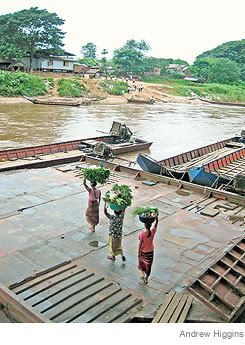Ladies, Check Your Underwear
 In Burma, where jobs are as scarce as freedoms, women in the border town of Myawaddy cross the muddy Moei River to Thailand, where, if they are lucky, can work for $4.30 a day sewing together bras that eventually reach our shores labeled as Vanity Fair or Maidenform.
In Burma, where jobs are as scarce as freedoms, women in the border town of Myawaddy cross the muddy Moei River to Thailand, where, if they are lucky, can work for $4.30 a day sewing together bras that eventually reach our shores labeled as Vanity Fair or Maidenform.The little tag in your underthings will read "Made in Thailand" if it is their handiwork, but your bra was probably made by Burmese, and to some extent at least, your bra is helping keep the world's longest-going military dictatorship in power. The riots that rocked Burma's larger cities earlier this month didn't ripple the waters in Myawaddy, thanks to its relative (very relative) economic prosperity.
Lest my lady readers burn their bras in protest, its good to remember what the American manager of the bra factory told the WSJ (subscribers only):
"There is nothing over there for them," says Michael Lurer, boss of the Top Form factory. The 32-year-old American argues that his jobs, providing take-home pay of about $3 a day, offer an opportunity for the hungry from Myanmar. "They have no food, no income, no nothing," he says, standing outside his riverside plant, a few miles from the Thai town of Mae Sot.We free market types see capitalism as the answer to the world's ills, and it is providing some relief to some desperate people on the Burma-Thailand border -- but it is also exploiting people who work for companies less enlightened, if we can use that word, than Top Form. Top Form is, of course, exploiting Burma's desparation to its advantage, but the operators of other factories in Myawaddy are far worse, keeping their workers penned into their factories, paying a fraction of the minimum wage, and offering no health care, as Top Form does.
No solutions are perfect, but the Burma Junta's utter destruction of one of Southeast Asia's most promising economies in the 45 years it has been in power shows that totalitarianism and state-run economies are no match for capitalism if the goal is a healthy, well-fed populace.
If Myawaddy's businesses were to be shut down through economic sanctions on the Junta, only the Burmese people would suffer. Our lingerie may go up a nickel or less in cost, which is nothing to us, but their income may go down a nickel or more, which is profound to them. So, all things considered, wear your "Made in Thailand" bras with a certain amount of pride. You're putting food on some otherwise empty tables.
photo: Andrew Higgins, WSJ
Labels: Burma, Capitalism, Foreign policy, Foreign Trade




<< Home